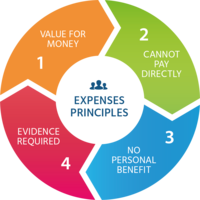Incurring expenses often happens when undertaking work for the University and there are a number of processes in place to help you avoid being out of pocket for costs incurred as part of your work.
The University operates four principles that underpin all University expense claims:
-
Value for money is achieved.
-
Expenses should only be used when it is not possible and/or practical for the University to pay for the good or service directly.
-
Costs incurred are for business purposes only, and the individual does not receive a personal benefit.
-
Only actual and evidenced costs are reclaimed.
The information across these pages will help you understand what can and cannot be claimed through the expenses process, and what supporting information you need to support your claim. Wherever possible, the University's Purchasing to Pay (P2P) system should be used to purchase goods or services in the first instance, with a University credit card being used as the second option. If these cannot be used, you may then use the expenses process to reclaim any expenses incurred.
From a legal perspective, HM Revenue and Customs’ (HMRC) rules and regulations of what can and cannot be claimed through expenses are embedded within UK law, and all businesses, organisations and charities must operate in accordance with them.
Expenses Policy
To help the University meet these legal requirements, our Expenses Policy and associated guidance are designed to guide claimants through incurring and claiming these expenses, ensuring the process is as easy and efficient as possible.



